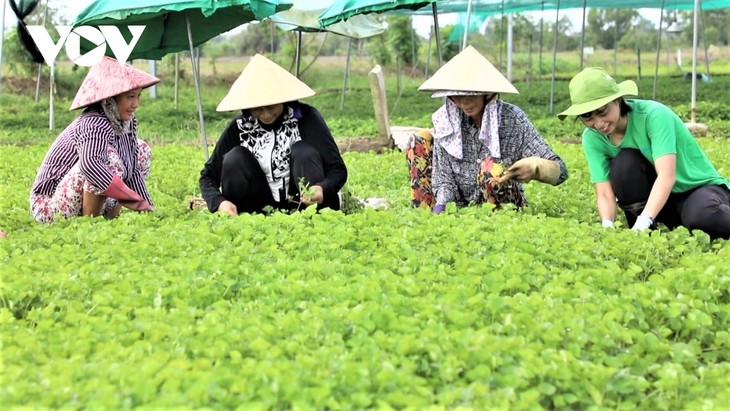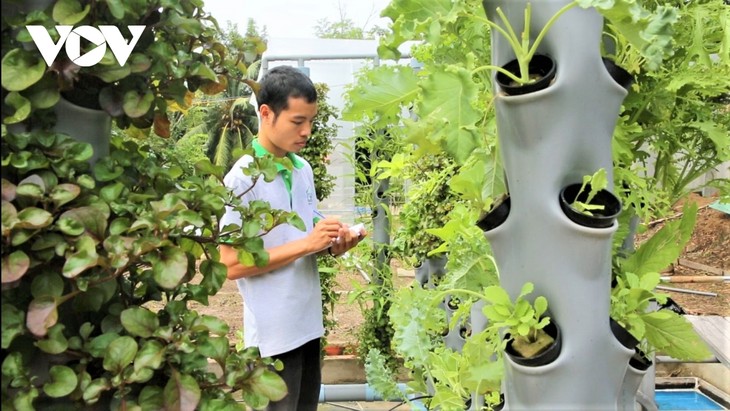(VOVWORLD) - As farming is doing ‘toil and moil’ work all year round for a long time, many farmers want their children to get a university education escape from the paddy fields, and maybe make a fortune. But recently in a reverse trend, young people are choosing to start up a business in agriculture and many have developed successful models.
 Nguyen Ngoc Huong (green shirt) is taking care of a pennywort garden with local farmers. Nguyen Ngoc Huong (green shirt) is taking care of a pennywort garden with local farmers. |
In recent years a number of agricultural models have won awards at startup competitions.
One model created by 32-year-old Nguyen Ngoc Huong of HCMC’s Cu Chi district produces freeze-dried powders from vegetables and leaves.
After graduating from the University of Economics in Ho Chi Minh City, Huong started a business working with pennywort, a plant of low economic value.
But the use of pasteurised freeze-dried technology has increased pennywort’s value.
Huong quit an office job to return to Cu Chi, where she rented some land, hired some local farmers to grow pennywort trees, and began to research and process pennywort powder.
“As a woman working in a field considered to have too many risks, I face lots of difficulties. First is establishing a farm. Second is developing a type of pennyworth powder that can completely replace fresh pennywort,” said Huong.
She learned how to use probiotics and apply VietGAP standards to perfect a pasteurised freeze-dried powder that retains the original flavour and colour of pennywort.
After succeeding with pennywort, Huong and her partners began developing other powders, like perilla, moringa, green tea, and lotus leaf.
Huong says her freeze-dried powders, branded Quang Thanh, are available at supermarkets and grocery stores nationwide. Last year, despite the COVID-19 pandemic, Huong exported big consignments to the Netherlands, Japan, the Republic of Korea, the US, and India.
Huong has created dozens of jobs and changed the mindset of farmers like Nguyen Van Ut about organic farming.
Mr. Ut told us, “I used to use a lot of chemical fertilizer. Organic farming doesn’t use fertilizer. It turns out high quality products without harming my health. I like working for Huong’s company.”
A startup called Green Farm, with headquarters in HCMC’s district 12, was established by a group of young people born in 1990s.
Many city dwellers would like to grow their own clean vegetables but finding space for a garden is tough.
The Green Farm group came up with an ERO-Farm model for growing vegetables using aeroponics technology, which requires no soil.
Vegetables are grown in a frame of tubes, each of which has a dozen holes. The system can be installed on a balcony or terrace as it doesn’t occupy much area, but it still produces enough vegetables for one family.
Green Farm supplies to the market 2 tons of clean vegetables each month and has sold ERO-Farm technology to more than 200 households in HCMC.
 Young engineer Nguyen Manh Tung is using his programming expertise to improve the aeroponic vegetable planting system. Young engineer Nguyen Manh Tung is using his programming expertise to improve the aeroponic vegetable planting system. |
Programmer Nguyen Manh Tung, one of the group’s members, said he’s very happy using his programming expertise to schedule automatic watering or monitor vegetable growth.
“I became increasingly passionate about agricultural models after I met some ambitious friends who were keen to develop high-tech products that can help any family produce their own safe food right at home,” said Tung.
The young founders of MrVina Technology Company develop high-tech, automated agriculture solutions for farmers.
MrVina's automatic watering and fertilising machine helps farmers reduce their dependence on natural conditions of soil and weather.
Pham Cao Ky, the Company’s Director, told VOV, “It’s obvious that Vietnamese people really want safe food. We’ve chosen to start an agriculture business even though we know it’s a tough path. After studying agronomy, biotechnology, programming, and IC design, we began to implement the project in 2013.”
Quang Thanh freeze-dried powders, Green Farm, and MrVina Technology Company are just three recent agricultural startups created by young people.
More and more young people are using new technologies to solve the problems of traditional agriculture.